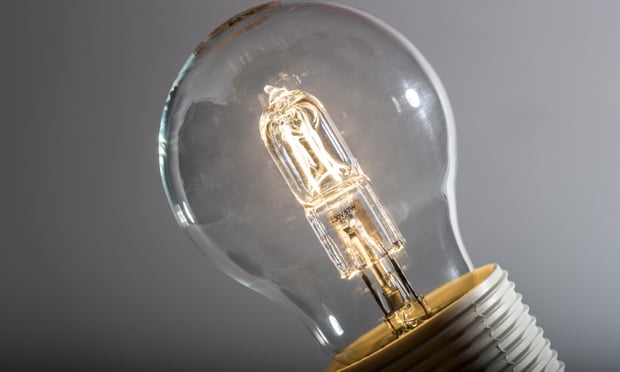Europe to Ban Halogen Lightbulbs
ENERGY, EUROPE, ENVIRONMENT, 27 Aug 2018
After nearly 60 years of lighting homes halogens will be replaced with more energy efficient LEDs.

Switching to LEDs has been estimated to save consumers up to €124 a year. Photograph: imageBroker/Rex/Shutterstock
23 Aug 2018 – After nearly 60 years of brightening our homes and streets, halogen lightbulbs will finally be banned across Europe on 1 September.
The lights will dim gradually for halogen. Remaining stocks may still be sold, and capsules, linear and low voltage incandescents used in oven lights will be exempted. But a continent-wide switchover to light-emitting diodes (LEDs) is underway that will slash emissions and energy bills, according to industry, campaigners and experts.
LEDs consume one-fifth of the energy of halogen bulbs and their phase-out will prevent more than 15m tonnes of carbon emissions a year, an amount equal to Portugal’s annual electricity usage.
Philips, the lighting manufacturer estimates consumer savings of up to £112 (€124) a year from the switchover because LEDs last much longer than halogens and use far less power.
But that has not stopped a perennial tabloid crusade against interference from Brussels – and the revival of timeworn Brexiteer campaign themes.
Jonathan Bullock, Ukip’s energy spokesman in the European parliament told the Guardian: “The EU’s attempt to ban halogen bulbs is wrong because consumers will suffer financially and it’s always the poorest who suffer most from these kinds of policies.”
“Customers should have the freedom of choice in bulbs and it shouldn’t be imposed by the EU.”
However, with incandescent bans spreading from California to Canberra, any post-Brexit revival might depend on inefficient Chinese bulbs – and these could add £90 to average energy bills, studies indicate.
At present, halogen bulbs are often individually cheaper than LEDs but extrapolating cost savings from that is “a false economy” according to Stewart Muir, a product manager at the Energy Savings Trust.
Ukip’s numbers “just don’t add up,” he said. “A halogen bulb may be cheaper to buy in the first place but the electricity costs will be much more expensive, whereas an LED bulb will pay for itself within a year.”
Halogen bulbs also last for just two years on average, compared to LEDs which have a 15-20 year life expectancy, he said.
The average British home has about 10 halogen lamps and uses each lightbulb for around three hours a day, according to government figures from 2012.
The emissions cost is staggering. Buildings account for about 40% of our energy consumption – and lighting currently accounts for around 15% of that. That gives it a carbon footprint higher than aviation and shipping combined.
Eliot Whittington, the director of the Prince of Wales’s corporate leaders group, which campaigns on the issue, said: “The science is clear. We can’t allow the human costs of climate change to reach the levels they will, if we fail to act. You ban things that threaten public safety and the wasteful use of energy is dangerous for us all in the end.”
Go to Original – theguardian.com
DISCLAIMER: The statements, views and opinions expressed in pieces republished here are solely those of the authors and do not necessarily represent those of TMS. In accordance with title 17 U.S.C. section 107, this material is distributed without profit to those who have expressed a prior interest in receiving the included information for research and educational purposes. TMS has no affiliation whatsoever with the originator of this article nor is TMS endorsed or sponsored by the originator. “GO TO ORIGINAL” links are provided as a convenience to our readers and allow for verification of authenticity. However, as originating pages are often updated by their originating host sites, the versions posted may not match the versions our readers view when clicking the “GO TO ORIGINAL” links. This site contains copyrighted material the use of which has not always been specifically authorized by the copyright owner. We are making such material available in our efforts to advance understanding of environmental, political, human rights, economic, democracy, scientific, and social justice issues, etc. We believe this constitutes a ‘fair use’ of any such copyrighted material as provided for in section 107 of the US Copyright Law. In accordance with Title 17 U.S.C. Section 107, the material on this site is distributed without profit to those who have expressed a prior interest in receiving the included information for research and educational purposes. For more information go to: http://www.law.cornell.edu/uscode/17/107.shtml. If you wish to use copyrighted material from this site for purposes of your own that go beyond ‘fair use’, you must obtain permission from the copyright owner.
Read more
Click here to go to the current weekly digest or pick another article:
ENERGY:
- China Opens World’s Largest Offshore Solar Power Facility
- Nuclear Industry Takes Control of NASA
- The Nuclear Energy Dilemma: Climate Savior or Existential Threat?
EUROPE:
- Norway's Prime Minister Accused of Complicity in Genocide
- The German “Drang nach Osten” Policy and Southeast Europe around 1900
- Germany’s New Political Landscape
ENVIRONMENT: